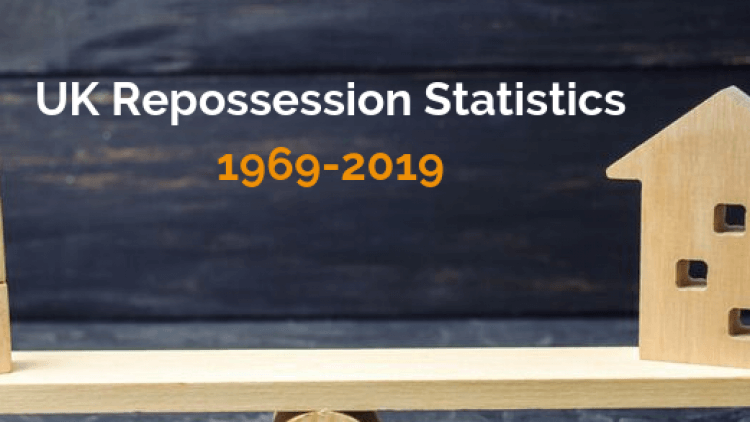Market factors, evolving lender practices, unemployment rates and economic policies have all influenced repossession statistics in the UK historically. In this article we have collected data from various sources to determine repossession trends in the UK.
Repossession Statistics 1969 to 2019:
|
Year |
Number of Mortgage Repossessions |
|
2019 |
4,580 |
|
2018 |
5,648 |
|
2017 |
5,542, |
|
2016 |
7700 |
|
2015 |
10,200 |
|
2014 |
20,800 |
|
2013 |
28,900 |
|
2012 |
33,900 |
|
2011 |
37,300 |
|
2010 |
38,500 |
|
2009 |
48,900 |
|
2008 |
40,000 |
|
2007 |
25,900 |
|
2006 |
21,000 |
|
2005 |
14,500 |
|
2004 |
8,200 |
|
2003 |
8,500 |
|
2002 |
12,000 |
|
2001 |
18,200 |
|
2000 |
22,900 |
|
1999 |
29,900 |
|
1998 |
33,900 |
|
1997 |
32,800 |
|
1996 |
42,600 |
|
1995 |
49,400 |
|
1994 |
49,200 |
|
1993 |
58,600 |
|
1992 |
68,600 |
|
1991 |
75,500 |
|
1990 |
43,900 |
|
1989 |
15,800 |
|
1988 |
18,500 |
|
1987 |
26,400 |
|
1986 |
24,100 |
|
1985 |
19,300 |
|
1984 |
12,400 |
|
1983 |
8,400 |
|
1982 |
6,900 |
|
1981 |
4,870 |
|
1980 |
3,480 |
|
1979 |
2,910 |
|
1978 |
4,130 |
|
1977 |
4,680 |
|
1976 |
4,950 |
|
1975 |
4,870 |
|
1974 |
3,290 |
|
1973 |
1,220 |
|
1972 |
1,760 |
|
1971 |
2,800 |
|
1970 |
3,760 |
|
1969 |
3,370 |
Sources: Cml.org.uk & Gov.uk
How Long Does it Take to Complete a Mortgage Repossession?
According to the 2015 repossession stats by Gov.uk, it takes:
- Approximately 20 weeks (5 months) for the court to issue an order once a repossession claim is made by a mortgage company or lender.
- Between 80 and 90 weeks (20 months apprx) for the court to issue a warrant after a repossession order is issued.
- 100 weeks or more for the actual repossession to complete from the day the claim was made. 100 weeks means roughly 2 years.
Historical Year on Year Data

Repossessions fluctuate on a regular basis, but these changes aren’t always easy to predict. Major economic and political events, like the 2007-2008 global crisis and the 2016 Brexit referendum, have a significant impact on the market. Here are some annual trends that might hint at what’s ahead:
How Many Repossessions Occurred Before and During the 2007/2008 Financial Crisis?
Data published by the Council of Mortgage Lenders, or CML, shows that from 1995 until the 2007-2008 financial crises, arrears on mortgages generally decreased. From that point on, the number of borrowers who were behind climbed until hitting a peak in 2009.
According to the housing charity Shelter, repossessions accounted for around 0.43 percent of all lending in 2009. This high was a notable increase from the 0.07 percent seen in 2003 and 2004, and it accounted for 48,900 properties being taken into possession.
How Many Repossessions in 2012?
Following the financial crisis, repossessions began slowly subsiding. In 2012, only around 33,900 mortgaged properties, or 0.30 percent of all housing loans, were repossessed. During this year, the majority of repossessions by county-court bailiffs in England and Wales were driven by mortgage troubles.
How Many Repossessions in 2013?
By 2013, mortgage repossessions had dropped to 28,900, or 0.26 percent. Low quarterly figures were seen as a positive factor, but experts also noted that the number of borrowers in severe arrears was still growing.
How Many Repossessions in 2014?
In 2014, repossessions continued falling. Unfortunately, many property owners still had ample reason to worry.
Shelter showed that around 215,000 households remained at risk of repossession or eviction and stressed that interest rate growth was just exacerbating the problem. This same year, areas like Bolton, Salford, Nottingham, Peterborough and London’s Newham were revealed as trouble spots.
How Many Repossessions in 2015?
Bolton, which had set the record for repossessions since 2004, continued to hold top position. Along with Manchester, Sunderland and some 73 percent of all Northern cities, Bolton was notable for having more repossessions than the national average.
Nonetheless, 2015 was an interesting year because the gap between repossession statistics in the North and the South narrowed dramatically. Experts claimed this was partially due to the fact that repossessions decreased nationwide, although the North still led the South by a significant factor. The high repossession rates that had long plagued London boroughs also exhibited great progress. The only question was whether these improvements would last.
How Many Repossessions in 2016?
The drop in the number of house repossessions from 2015 to 2016 was quite significant with there being 7,700 repossessions across the UK compared to 10,200 in 2015. According to the CML, low interest rates have helped to prevent repossessions and keep mortgage costs down, however with inflation slowly rising they warn that it won’t last forever.
How Many Repossessions in 2017?
Claims for possession increased 17% (compared to the same quarter last year) from 4739 to 5542.
How Many Repossessions in 2018?
2018 saw home repossession claims by mortgage companies increase by a third year-on-year during the final quarter, reaching a total of 5648. These figures released from the Ministry of Justice suggest that the creaking economy and Brexit could have had an impact on the number of households struggling financially.
How Many Repossessions in 2019 and Beyond?
House repossessions reached an all time low in 2019, in fact the number of homes repossessed in the UK was at the lowest level it has been since 1980 this year as revealed by BBC. This is thought to be because of lower mortgage rates and a less aggressive attitude from lenders.
Despite the seemingly positive drop in numbers, experts are warning homeowners to remain vigilant as things could quickly return to a time with increasing pressure on real incomes and rising interest rates.
If your home is being repossessed and the order has been served, first thing you should do is to stop the repossession order. You can click here to know how we can help you stopping your home being repossessed.
Do You Need Help With Repossession?
Need some advice or help on how to stop your home from being repossessed?
Get in touch with our expert team today for professional advice and a FREE quote.







